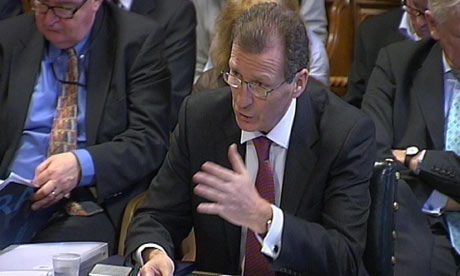What an outrageous situation that an unelected civil servant on the public payroll can deny the same public the right to know what Bush and Blair were really saying to each other - as against what they were saying in public - in the run-up to the invasion of Iraq that has killed and maimed millions on the justification of a calculated lie. Sir Gus O'Donnell you are bloody disgraceful and how on earth can such a person have the authority to do this simply, in truth, to watch the backs of this cold and genetically mendacious pair of fraudulent manipulators, Tony Blair and his spinner and enforcer, Alastair Campbell. 'Do you think we got away with it, Tony?' 'Well, Gus did us proud and I'll just keep lying and holding this fake smile - it's always worked before.' 'Fingers crossed then.' Sir Gus O'Donnell stops publication of documents Chilcot inquiry says are crucial to understanding how invasion happened Britain's top civil servant, Sir Gus O'Donnell, is preventing the official inquiry into the Iraq invasion from publishing notes sent by Tony Blair to George W Bush - evidence described by the inquiry as of "central importance" in establishing the circumstances that led to war. O'Donnell, the cabinet secretary, consulted Blair before suppressing the documents, it emerged tonight. The Cabinet Office said: "There is an established convention covering papers of a previous administration whereby former ministers would normally be consulted before release of papers from their time in government." The prime minister's spokesman said David Cameron had not been consulted. Raising the stakes ahead of Blair's recall on Friday, Sir John Chilcot, the inquiry's chairman, released a sharp exchange of letters with O'Donnell in which he repeated requests for the notes to be declassified. Chilcot said: "The material requested provides important, and often unique, insights into Mr Blair's thinking and the commitments he made to President Bush, which are not reflected in other papers." In a letter dated 6 January, his third to O'Donnell in less than a month, Chilcot wrote: "The question when and how the prime minister made commitments to the US about the UK's involvement in military action in Iraq and subsequent decisions on the UK's continuing involvement, is central to its considerations". He refers to passages in memoirs, including Blair's autobiography, A Journey, and disclosures by Jonathan Powell, Blair's chief of staff, andAlastair Campbell, his former head of communications. Those publications, and the refusal to disclose Blair's notes, Chilcot said, "leads to the position that individuals may disclose privileged information (without sanction) whilst a committee of privy counsellors established by a former prime minister to review the issues, cannot". Chilcot, who, with his four-member panel, has privately seen Blair's notes, said the documents "illuminate prime minister Blair's positions at critical points". O'Donnell replied to Chilcot that releasing Blair's notes would damage Britain's relations with the US. and would not be in the public interest. "We have attached particular importance to protecting the privacy of the channel between the prime minister and president," he told Chilcot. The Cabinet Office said the refusal to allow Blair's notes to be disclosed conformed to the inquiry's protocols. Chilcot said recently the protocols were "put in place to protect national security, international relations and the personal security of individuals. They are not there to prevent embarrassment." In evidence to the inquiry last year, Campbell described the tenor of Blair's notes to Bush as: "We share the analysis, we share the concern, we are going to be with you in making sure that Saddam Hussein is faced up to his obligations and that Iraq is disarmed." Campbell added: "If that cannot be done diplomatically and it is to be done militarily, Britain will be there. That would be the tenor of the communication to the president." The inquiry has also heard from senior British diplomats that regime change was being discussed by Blair in meetings with Bush in 2002 even though, according to leaked documents, Lord Goldsmith, the attorney general, warned that military action aimed at regime change, as opposed to disarmament, would be unlawful. One document, previously leaked, notes that Blair told Bush at a meeting in Washington on 31 January 2003, less than two months before the invasion, that "he was solidly with the president". That was his response after Bush said military action would be taken with or without a new UN resolution and the day after Goldsmith warned Blair that an invasion of Iraq would be unlawful without a fresh UN resolution. Goldsmith subsquently changed his mind. An inquiry official said: "It not about what President Bush told prime minister Blair. It is about what Mr Blair said to President Bush." The inquiry has summoned back the former prime minister, to press him about what he promised Bush in private, and why he repeatedly questioned, then shut out, his government's chief law officer, Lord Goldsmith, after receiving unwelcome advice about the legality of an invasion. Simon Jenkins, page 31Whitehall chief blocks publication of Blair's notes to Bush on Iraq to save him from public exposure and disgrace


Whitehall chief blocks release of Blair's notes to Bush on Iraq

Wednesday, 19 January 2011
Posted by
Britannia Radio
at
18:13
![]()





















